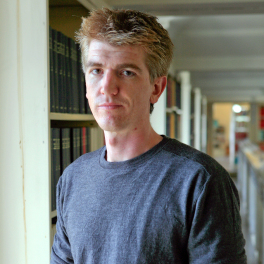Special MIG Seminar – James Briscoe – Monday 16th September, 2019

James Briscoe
Senior Group Leader, The Francis Crick Institute, UK
Host: Michael Stumpf
Monday 16th September
3-4pm
Turner Theatre, BioSciences 2 Building, The University of Melbourne
The Dynamics of Spinal Cord Development
Abstract
The generation of the correct cell types at the appropriate position and time is the first step in the assembly of functional tissues. One well-studied example is the development of the vertebrate spinal cord. In this tissue, distinct neuronal subtypes are generated in a precise spatial order from progenitor cells arrayed along the dorsal-ventral axis of the neural tube. Underpinning this organization is a complex network of extrinsic and intrinsic factors. Particularly well understood is the mechanism that determines the generation of different neuronal subtypes in ventral regions of the spinal cord. In this region of the nervous system, the secreted protein Sonic Hedgehog (Shh) acts in graded fashion to organize the pattern of neurogenesis. This is a dynamic process in which exposure to Shh generates progenitors with successively more ventral identities. At the same time tissue growth alters the arrangement of cells and the proportions of cell types and contributes to the elaboration of pattern. A gene regulatory network composed of transcription factors regulated by Shh signaling play an essential role in determining the graded response of cells. Thus, accurate patterning of the neural tube and the specification of neuronal subtype identity relies on the interplay of cellular and molecular processes.
Bio
James Briscoe is a senior group leader at The Francis Crick Institute. Following a PhD in Ian Kerr’s laboratory at the Imperial Cancer Research Fund, London, he worked at Columbia University, first as a Human Frontiers Science Program Fellow then as a Howard Hughes Medical Institute Fellow. In 2000 he moved to the MRC-National Institute for Medical Research (now part of The Francis Crick Institute) to establish his own research group and in 2001 he was elected an EMBO Young Investigator. He was awarded the EMBO Gold Medal in 2008 and elected to EMBO in 2009. In 2018 he became Editor in Chief of Development. He was elected a Fellow of the Academy of Medical Sciences and a Fellow of the Royal Society in 2019. His research interests include the molecular and cellular mechanisms of graded signalling by morphogens and the specification of cell fate in the vertebrate neural tube. To address these questions his lab uses a range of experimental and computational techniques and model systems that include mouse and chick embryos and embryonic stem cells.
Enquiries: Andrew Siebel (asiebel@unimelb.edu.au)